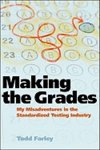High-stakes testing has become so prevalent in American public schools that the terms "student achievement" and "test scores" are used interchangeably by pretty much everybody.
Much muck has been raked about how the high-pressure exams don't assess students' abilities and learning fairly or accurately. The extreme emphasis on test prep de-motivates students and distorts curricula. Teachers become disillusioned and leave the profession. Elected officials and contract-hungry test-making corporations have vested interests in getting favorable stats. Last month, Diana Senechal at gothamschools.org proved it was possible to guess randomly on New York State exams and pass.
Now, a new bomb has been tossed into this discussion, and this time it's coming from within the testing industry. Todd Farley, long-time test-grader at multiple testing companies, has penned Making the Grades: My Misadventures in the Standardized Testing Industry, a highly readable memoir of dysfunction in the land of the Big Test.
Todd's book comes out this week. I read it over a year ago in manuscript form and it blew my mind; my blurb is on the back cover. I think it's a must-read for anyone connected to education. In an op-ed in today's New York Times, Todd shares a few darkly humorous tidbits. Here's one:
A couple of years ago I supervised a statewide reading assessment test. My colleague and I were relaxing at a pool because we believed we'd already finished scoring all of the tens of thousands of student responses. Then a call from the home office informed us that a couple of dozen unscored tests had been discovered.Because our company's deadline for returning the tests was that day, my colleague and I had to score them even though we were already well into happy hour. We spent the evening listening to a squeaky-voiced secretary read student answers to us over a scratchy speakerphone line, while we made decisions that could affect somebody's future.
As Todd demonstrates in his book, irresponsibility and arbitrariness in grading students' important "open-ended responses" were the rules, not the exceptions.
In the No Child Left Behind era, pretty much every pillar of our education system rests on the presupposition that standardized tests are accurate indicators of how our kids are doing. Todd Farley helps to bring into even clearer, starker focus that this is a flawed ideology.
In this week's New York Times Magazine (the school issue), Diane Ravitch hammers home the problems with the narrow-mindedness of testmania:
Students can get higher scores in reading and mathematics yet remain completely ignorant of science, the arts, civics, history, literature and foreign languages.
Why do we educate? We educate because we want citizens who are capable of taking responsibility for their lives and for our democracy. We want citizens who understand how their government works, who are knowledgeable about the history of their nation and other nations. We need citizens who are thoroughly educated in science. We need people who can communicate in other languages. We must ensure that every young person has the chance to engage in the arts.
Amen!
Dan Brown is the author of The Great Expectations School: A Rookie Year in the New Blackboard Jungle.
